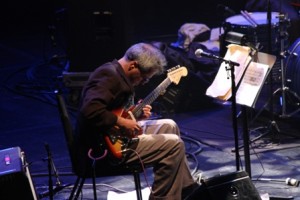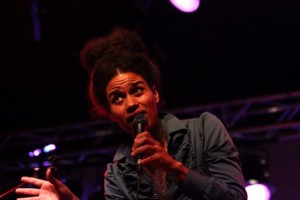
Joy Frempong of Filewile performing at Montreal Jazz (photo by Seth Rogovoy)Joy Frempong of Filewile performing at Montreal Jazz (photo by Seth Rogovoy)
MONTREAL INTERNATIONAL JAZZ FESTIVAL
Saturday, June 25, 2011
Review by Seth Rogovoy
(MONTREAL) – It didn’t take long to be reminded why I keep coming back to the Montreal International Jazz Festival. It’s the element of surprise and discovery, more than anything, that makes a festival appealing. Sure, there’s the opportunity to hear tons of great music all in the span of a few days within a few city blocks, and at Montreal, a lot of it is free. But rather than catching up with old favorites, it’s the thrill of stumbling upon a fabulous mind-blowing group like Filewile, as I did last night, that makes it all worth it.
The evening got off to a bright start with a concert by an old favorite, guitarist Marc Ribot, fronting his punk-infused Ceramic Dog trio featuring Shahzad Ismaily on bass and Ches Smith on drums. Talk about surprise – amidst the skronk and electronics and free-jazz mania for which Ribot is known at his most extreme, the guitarist/visionary played a Ribotized version of Dave Brubeck’s “Take Five.” It’s probably fair to say that never in Brubeck’s dreams (or nightmares) would he have imagined his jaunty little experiment in five-four time rendered on guitar with some surf-noir accents while the bass line throbbed like something out of Metallica.
But it was actually beautiful, and Ribot played through the melody lines pretty straight several times before veering off into uncharted territory. In the end, it made one wonder if in fact Brubeck’s imagination has been underestimated; after all, if Ribot and crew could have taken “Take Five” into this territory, there must have been something in Brubeck’s original composition, in Brubeck’s DNA itself, that could have allowed or suggested that. Maybe Brubeck was his generation’s John Medeski after all.
The marquee performance of Saturday night was a free outdoor concert on the biggest plaza stage featuring Ben L’Oncle Soul, a young French soul singer, still in this twenties, who is apparently a heartthrob in the Francophone world, judging from the response he evoked from the thousands of concertgoers, especially the females. Ben updates the classic pop-soul of Motown, with clean group dance choreography and harmonies and a chaste stage show that emphasizes old-fashioned romance over lust; he dresses in a suit of red trousers, white shirt, blue blazer, red bowtie, tan fedora and nerdy tortoise-shell eyeglasses. He is no Kanye West, in other words.
Ben mixes in covers of classic tunes like Stevie Wonder’s “Signed Sealed Delivered” and Otis Redding’s “Try a Little Tenderness” with his original French soul. He’s got great stage presence and made great use of the huge stage, and he knows how to work a crowd of thousands. If there’s nothing particularly original or creative about what he does, that didn’t seem to matter to the thousands who obeyed his every request to sing this, sing that, sway your hands to the left, to the right, and freeze.
Filewile was the antidote, an utterly original quartet that variously recalled Big Audio Dynamite, Patti Smith, the Clash, and Finley Quaye, yet was really like none of them. Apparently based in Switzerland, the group plays an eclectic blend of trip-hop influenced pop and rock with heavy doses of reggae, Afrobeat, electronica, and dub. The group has its roots as a laptop duo (Andreas Ryser of Dustbowl and Daniel Jakob of Dejot started out in 2003 as mobile laptop street musicians), but in its new incarnation all the focus is (or should be) on its dynamic frontwoman, vocalist Joy Frempong, a native of Ghana performs solo as OY, and who is herself a catalog of vocal styles and tricks – in addition to being an accomplished rapper and toaster, she boasts a huge catalog of animal noises, sound effects, whistles, very few of which seemed electronically altered.
Filewile uses its eclectic bag of sounds and styles, like B.A.D. before it, in the service of songs that take on nothing less than world social and political commentary. Songs touted vegetarianism, environmentalism, and animal rights. Several futuristic numbers that had band members assume the persona of robots (including “Robibot” and “Radiotower”) seemed to deal with alienation and dehumanization, and “Number One Kid” had Frempong asking the question, what drives a man to want to be a dictator?
But like the Clash and B.A.D. before it, the group’s politics and serious point of view never gets in the way of the music, and no matter how seriously intent and regal Joy Frempong was at getting those points across, it was the overall delivery – the medium rather than the message – that mattered most. And this medium was one crackling with organic excitement of a new kind of world-rock that for one brief hour made one interested again in contemporary music.
And that made the trip to Montreal worth it on the very first night.
Seth Rogovoy is an award-winning music critic and the author of Bob Dylan: Prophet Mystic Poet.



